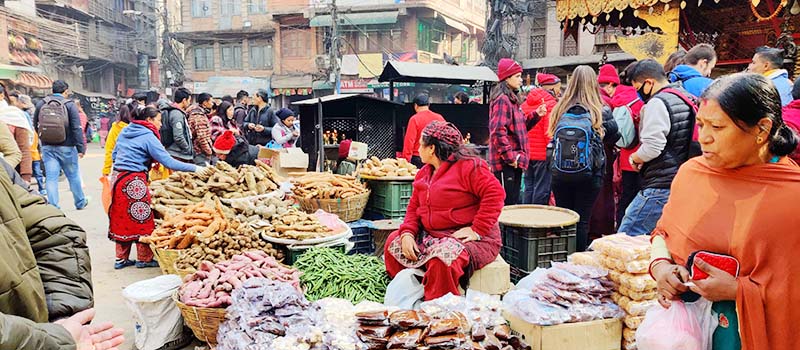Could COVID-19 disruptions change agriculture sector?
KATHMANDU, JULY 14
Like every other sector severely affected by the coronavirus pandemic since the beginning of this year, the agriculture sector was also not spared by the pandemic, with each smallholder farmer reportedly incurring losses between Rs 700,000 and Rs 800,000.
While the government does not even have the exact data of the losses incurred in the sector, some stakeholders believe the pandemic has provided a rare opportunity to promote agriculture in the country.
Farmers’ woes
The lockdown imposed in the country from March 24 to control the spread of the highly infectious virus took a huge bite out of the vegetable market — while the demand for vegetables plunged drastically, farmers were forced to let their produce rot in the fields due to movement restrictions. Most farmers reportedly even destroyed their harvest in the lack of market.
Even as the government announced that vehicles transporting essential products, including vegetables, would be allowed to ply, farmers in the rural areas claim they were unable to supply their produce to the market as the suppliers were unable to travel to the fields to collect the produce.
Normally the market is flooded with local vegetables between the months of May and July and farmers usually make good profit in this period. “But, due to the lockdown this year, local production far exceeded demand, forcing farmers to slash the price of their produce,” said Khom Prasad Ghimire, president of the Federation of Fruits and Vegetable Entrepreneurs.
As per him, the price of vegetables this year is most likely at record lows.
“Selling the vegetables at whatever price they are getting is better than letting them just rot in the fields or destroying them,” Ghimire said, adding that while this situation had benefited the consumers, the farmers have not been able to even break even.
Due to lack of market some farmers even resorted to home delivery of vegetables. Vegetables from Kavrepalanchowk, Palung, Dhading, Chitwan, Makawanpur, Bhaktapur and Kathmandu are being supplied in the valley at the moment.
According to farmers, vegetables produced in Chitwan, Dhading, Kavre, Dang, Bara and Makawanpur can fulfil almost 75 per cent demand of vegetables in the country.
Krishna Raj Suwal, a vegetable farmer from Bhaktapur, said the government has to bridge the gap between farmers’ products and the market. “There are lots of small farmers who were not getting a market for their products before the COVID-19, the pandemic further exacerbated the situation,” he said.
Each small farmer has faced losses amounting to Rs 700,000 to Rs 800,000 during this pandemic, he added.
Govt lacks data
Despite the outcry, the government does not even have the details of the losses in the agriculture sector.
“We had tried to collect the details of losses in the agriculture sector in the first month of the lockdown, but the process was not given continuity,” admitted Hari Bahadur KC, spokesperson for the Ministry of Agriculture and Livestock Development (MoALD).
As per him, before the budget announcement MoALD had collected the losses faced by different sectors of agriculture in the first month of the lockdown targeting to provide relief to them. However, as the Ministry of Finance largely ignored the proposals for relief submitted by MoALD, the latter halted the activity of collecting loss details in the sector.
Meanwhile, KC claimed the ministry is conducting impact assessment of COVID-19 on agriculture sector in coordination with United Nations Food and Agriculture Organisation.
An opportunity?
One bright spot in what can otherwise be considered a dark and dreary situation is that apart from the vegetables that are not produced within the country, the import of vegetables was almost completely halted during the lockdown period.
With reduced demand and ample supply, local produce was more than enough. Hence, the stakeholders have said that the pandemic should be an eye-opener for the opportunities in the agriculture sector.
“We’ve been complaining that mostly only women and senior citizens are highly involved in the agriculture sector. However, during the pandemic a large number of youths have returned from abroad and are willing to get involved in the sector.
We have to mobilise that manpower,” opined Uddhav Adhikari, former president of National Farmers Group Federation.
He further said that the public has also become aware of the importance of being self-sufficient in agriculture.
“Most people have come to realise that if we can grow sufficient produce to cater to the local market, we won’t have to face food scarcity during such pandemic.”
According to him, a lot of people practised farming in their terraces during the lockdown period as hordes of people returned to their villages when the lockdown was imposed.”Now taking advantage of this situation, the government should bring policies to promote the sector and make it profitable.”
A version of this article appears in e-paper on July 15, 2020, of The Himalayan Times.






